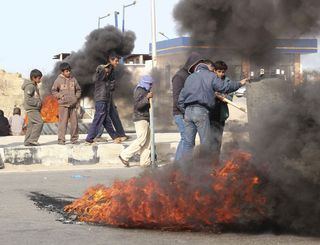Delusions amid the Pyramids
 My own experience of Egypt is limited to seeing a demonstration broken up by plainclothes police thugs who later overpowered my photographer colleague Phil Ide and stripped him of thousands of pounds' worth of equipment (not to mention the fruits of a day's hard work) which he did not recover for many months. Luckily they weren't interested in me at all. These people are above the law and will happily rough up foreigners as well as their 'own' people.
My own experience of Egypt is limited to seeing a demonstration broken up by plainclothes police thugs who later overpowered my photographer colleague Phil Ide and stripped him of thousands of pounds' worth of equipment (not to mention the fruits of a day's hard work) which he did not recover for many months. Luckily they weren't interested in me at all. These people are above the law and will happily rough up foreigners as well as their 'own' people.
The demonstration, just after Friday prayers in a poor and dusty district of Southern Cairo, was - oddly enough - against the Iraq war. The Egyptian government receives enormous subsidies from the USA (I think around £1,500,000,000 a year, much of it in the form of weapons) in return for maintaining its 'Cold Peace' with Israel, and regards attacks on Washington as attacks on itself.
I spoke to quite a few of the protestors, who were friendly, articulate people of both sexes and all ages, until the state musclemen burst into the cafe where I was and started to arrest them ( again, they weren't interested in me).
So I think I can say I have no special fondness for the Mubarak regime. Like every Arab regime I know of, it relies ultimately upon brute force. That brute force defends a system which is extremely corrupt and inefficient, in which free speech, free assembly and the liberty to organise opposition are more or less forbidden, though a sort of token opposition is permitted to function, and its leaders seem surprisingly resigned to spending long periods in the country's unlovely prisons.
But I am amazed at the way in which Western journalists and politicians now seem to be encouraging street protests against that regime. What do they think will happen? Who do they think will benefit? What do they expect the long-term result to be?
Egypt does not have a western-type civil society waiting to step into the gap left when the Mubarak state falls. The most potent opposition movement is the Muslim Brotherhood, and the most popular cause is enraged hatred of the neighbouring State of Israel. Since Egypt is heavily armed and right next to Israel (and Gaza) would it necessarily be a good idea to encourage events which might install an Islamist government in Cairo?
 Those who support dissent in Islamic countries really ought to have learned by now that the will of the people in these places is not necessarily in our favour. Western opinion was largely sympathetic to the 1979 rising against the Shah of Persia, until it realised far too late what would replace it. They're all sorry now. A couple of years ago a great deal of sentimental tosh was talked about a wave of democracy in the Middle East, supposedly comparable to the peaceful overthrow of Soviet-backed regimes in eastern Europe in 1989. This was supposedly inspired by the 'success' of our imposition of a Shia majority government in Iraq, a story which has not yet reached its end and which will not – I here predict - end happily.
Those who support dissent in Islamic countries really ought to have learned by now that the will of the people in these places is not necessarily in our favour. Western opinion was largely sympathetic to the 1979 rising against the Shah of Persia, until it realised far too late what would replace it. They're all sorry now. A couple of years ago a great deal of sentimental tosh was talked about a wave of democracy in the Middle East, supposedly comparable to the peaceful overthrow of Soviet-backed regimes in eastern Europe in 1989. This was supposedly inspired by the 'success' of our imposition of a Shia majority government in Iraq, a story which has not yet reached its end and which will not – I here predict - end happily.
Much gush was penned and spoken about a 'Cedar Tree' Revolution' in Lebanon, which was boldly rejecting the sinister presence of Syria on its territory, etc etc. I sighed when I heard this, as I sigh when I hear the current wave of enthusiasm for events in Tunisia and Egypt. And I was right to sigh, for Lebanon is now under the control of a Hizbollah government, closer than ever to Syria (and to Iran) and silly dreams of a new dawn are all dissipated, as they were bound to be.
Otto von Bismarck is supposed to have said that if you enjoyed either sausages or politics you should make sure you never saw either of them being made. The same is true of diplomacy. If you don't like propping up nasty regimes, don't go in for foreign policy. The only genuine and serious conclusion, for those who truly want to make the world a better place, is to pursue a policy of enlightened imperialism. But is this realistic? Ask yourself a few questions? Are you convinced enough of the superiority of our civilisation to feel you have the moral right to impose it on others by force? Think we can afford it? Fancy serving in the enormous armed forces necessary to impose it, or paying the huge taxes needed to finance those forces, or allowing your relatives to be conscripted into those forces? Are you prepared to stay forever?
If the answer to any of these questions is 'no', then please be so kind as to stop pretending to care about the woes of the Third World. You don't mean it. You're trying to make yourself feel good, not to do good.
Meanwhile the best motto for dealing with nasty regimes in the Middle East remains, as it always was, Hilaire Belloc's words: 'Always keep a hold of nurse, for fear of finding something worse.' Literary types will know what happened to poor Jim, who ignored this sensible advice. He was devoured ('slowly eaten, bit by bit, no wonder Jim detested it') by a Lion.
If you want to comment on Peter Hitchens, click on Comments and scroll down.
Peter Hitchens's Blog
- Peter Hitchens's profile
- 296 followers



